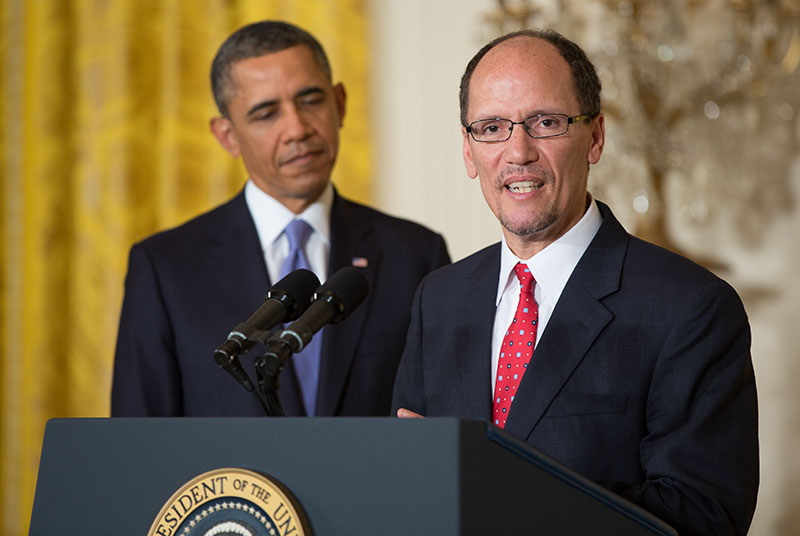Many business owners across the nation are angry over a recommended rule applied by the Obama Administration. This rule requires employers to pay employees making less than approximately $47,000 to receive appropriate overtime pay when they work more than 40 hours a week. This includes those who are on salary and not hourly wages.
Although many employers honored overtime before this rule, many businesses still don't, which is why advocates of this rule feel it's necessary. For small business owners, however, they feel this rule will strap their already limited funds, which is why the State of Texas and 20 other states have filed a lawsuit that challenges this rule.
Thus, LIVE! decided to look further into this rule and how it will affect our area.
What is the Fair Labor Law Act and How Does it Affect Me?
The Fair Labor Standards Act (FLSA) establishes minimum wage, overtime pay, recordkeeping, and youth employment standards for employees in the private sector, Federal, State and local governments.

Above: Secretary of Labor Thomas Perez/Photo courtesy of The White House
In 2014, President Obama asked the Department of Labor to update its regulations pertaining to the protection of workers under the FLSA’s minimum wage and overtime standards. It took two years to draft these new regulations. In May 2016, President Obama and Secretary of Labor Thomas Perez announced the publication of the final rule on the Department of Labor’s overtime regulations. The new legislation, according to the U.S. Department of Labor’s website, will “automatically extend overtime pay protections to over 4 million workers within the first year of implementation.” This final update was a means to ensure that “every worker is compensated fairly for their hard work.”
Unless classified "exempt," employees who fall under the FLSA are entitled to receive overtime pay for hours worked “over 40 in workweek at a rate not less than time and one-half their regular rates of pay.”
Yet, there is also a particular definition to what constitutes a 40-hour workweek. It is “- a fixed and regularly recurring period of 168 hours or seven consecutive 24-hour periods.” This workweek can begin any day of the week, and there may be different workweeks for different groups of employees. The impact on employers and employees will be considerable.
In fact, the Attorney General of Texas Ken Paxton’s website mentions that the Act will “more than [double] the salary threshold for a worker to be entitled to overtime [pay]” from the previous $23,660/year to $47,476/year.
The State of Texas and 20 Other States Sue the Department of Labor

Above: Photo of Texas Attorney General Ken Paxton courtesy of Facebook
Many states are upset by the changes that have been applied to the overtime regulations, and among them is the State of Texas.
This last week, Texas initiated a major lawsuit against the U.S Department of Labor concerning the new rules on overtime and the White House’s effort of making millions of working Americans eligible for overtime pay. The lawsuit is spearheaded by Texas Attorney General Ken Paxton, who has joined forces with the Attorney General of Nevada Adam Laxalt.
Paxton believes that, “once again, President Obama is trying to unilaterally rewrite the law.” According to Paxton, "The Obama administration has imposed numerous crippling federal regulations on businesses in this country," and for Paxton, that “has been bad enough;” but passing a rule like the new overtime regulation is, for him, “inexcusable.”
Laxalt also believes that the new rule “tramples on state and local government budgets, forcing states to shift money from other important programs to balance their budgets, including programs intended to protect the very families that purportedly benefit from such federal overreach.”
Paxton claims this new rule “may lead to disastrous consequences for our economy,” for the new rule will require some business to potentially demote or lay off workers whom they can not afford to pay any longer.
In response to the lawsuit by Paxton and Laxalt, Perez responded, “We are confident in the legality of all aspects of our final overtime rule” and he underscored that the rule was a result of “a comprehensive, inclusive rule-making process.” Among the states suing the Department of Labor are Alabama, Arizona, Arkansas, Georgia, Indiana, Iowa, Kansas, Kentucky, Louisiana, Maine, Michigan, Mississippi, Nebraska, New Mexico, Ohio, Oklahoma, South Carolina, Utah and Wisconsin. Click here for more information on this specific court case.
Closer to Home

Above: Photo of U.S Chamber of Commerce courtesy of Facebook
The Texas Association of Business, the U.S. Chamber of Commerce and various business leaders have filed a joint lawsuit against the Department of Labor, similar to the one filed by the State of Texas. For the President of the Texas Association of Business, "the Department of Labor has really exceeded its statuary authority.” The San Angelo Chamber of Commerce is among the many Texas chambers of commerce participating in this lawsuit. To find a full list of all chambers of commerce and business leaders suing the Department of Labor, please visit here.
Additionally, fair overtime pay might also be an issue in San Angelo. Recently, San Angelo LIVE! received an anonymous letter from an employee, working in the hospitality industry, who had received a check and notice that employees were receiving this check from an employer as a result of an audit. The business was charged a penalty. Although this may not be a direct result of the new law, it's an example of what other businesses might face for failing to pay overtime wages.
The employer acknowledged that the business had not been paying overtime correctly and was “unaware” in doing so. Thus, the business apologized for underpaying employees. Overtime regulations are not necessarily knowledge to all business owners. This particular business owner stated that ”this is a law that wasn’t known to me, my accountant, other accountants I know”.
When LIVE! tried to follow up on the issue, we were told there had been no audit conducted. However, the letter we received proved otherwise.
With the new rule, many businesses may face the same issue.
One Last Thought ….
Overtime, or a lack of it, affects many American employees, not just employers. There are millions of American workers who are exempt from overtime rules because they are classified as executives, administrators or professionals. Despite working more than the standard 40-hour workweek, they are not compensated for their overtime work.
With that being said, for more information on how the final rule will affect you and/or your business, please visit the Department of Labor’s Overtime Rule website here.
Subscribe to the LIVE! Daily
Required






Comments
Listed By: Patrick Dierschke
How is this effecting CPS caseworkers? Most are well below the salary threshold, and put in way more than 40 hours per week. Will they now be able to submit for overtime?
- Log in or register to post comments
PermalinkListed By: Proud Band Mom
Patrick,
Unfortunately, CPS caseworkers are exempt employees so the overtime rules do not apply.
- Log in or register to post comments
PermalinkListed By: Brandy Ramirez
Patrick,
Per the rule, if the employee is not exempt and makes less than the approximate $47,000 threshold, a CPS worker would definitely qualify for that overtime.
- Log in or register to post comments
PermalinkListed By: Patrick Dierschke
Thought so, could there be a follow-up to ask DFPS how they are handling it?
There is already a shortage of caseworkers in our area. Wishful thinking, but maybe in this next legislative session, they will give them raises over the threshold??
- Log in or register to post comments
PermalinkListed By: Brandy Ramirez
We can definitely check on that. We're working on a few stories tied to CPS, so we'll see what they have to say.
Regards,
Brandy
- Log in or register to post comments
PermalinkListed By: Patrick Dierschke
Great to hear. While you have the ear of CPS, ask them why the Child Placing Agencies are leaving town. A World for Children and Arrow have both moved their offices out of San Angelo to Brownwood in the past year. A World for Children and Children's Hope does not have a local caseworker living in San Angelo. High Sky's main office is in Midland and New Horizons reports to Abilene. It is hard to recruit foster parents when there is no one local to support them.
- Log in or register to post comments
PermalinkListed By: AmongTheLiving .
The coaches at Sitel are regularly given more work than they can reasonably finish in a 40 hour work week, and the attitude from upper management is "I don't care, get it done". Maybe now they will start to be a little more reasonable with their requests of their coaches....but I won't hold my breath.
- Log in or register to post comments
PermalinkListed By: Yosemite Sam
Classifying workers as "executives, administrators or professionals" is a way for a business to get away not paying overtime. Many of these workers don't supervise anyone and are often technicians or customer service agents in salaried positions but putting in more than a 40-hour workweek.
- Log in or register to post comments
PermalinkPost a comment to this article here: